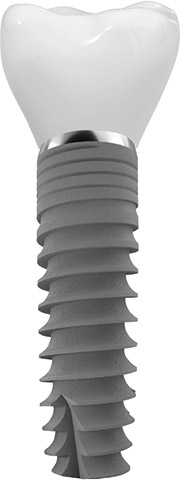PATIENT INFORMATION
Chewing, talking, smiling…
Our teeth matter in many areas from basic needs such as nutrition to our aesthetic appearance.
What if we lose our teeth?
Losing our teeth is a distressing experience that can happen any time as a result of insufficient oral care, genetic or stress-induced gingival problems, age-related osteoporosis, and unfortunate accidents.
 This experience is costly in many aspects, especially in terms of health and aesthetics. However, today, thanks to ImplatechOne products, you can have a healthy, aesthetic smile that is even more perfect than before.
This experience is costly in many aspects, especially in terms of health and aesthetics. However, today, thanks to ImplatechOne products, you can have a healthy, aesthetic smile that is even more perfect than before.
ImplatechOne implants replace the lost teeth functionally and aesthetically with the closest appearance to the natural tooth.
ImplatechOne Dental Implants,
- Maintain the natural structure of your face and your smile,
- Bring back the lost lip aesthetics,
- Look and function like your natural teeth,
- Eliminate the issues with chewing and speaking,
- Do not require your natural teeth to be cut for bridge support,
- Prevent bone loss by protecting the surrounding bone.
With all of these features, ImplatechOne implants give you a much healthier and aesthetic appearance.
WHAT IS AN IMPLANT?
An implant is an artificial tooth root in the form of a screw and a cylinder placed inside the jaw bone. Implants made of titanium, which is a material that is accepted by bone tissue, are very resilient and cause no concerns of rejection by the body. Titanium plates and screws have been used successfully for years in the medical field, especially in orthopedics.
Today, implant technology makes our lives easier by becoming the most successful prosthetic solution that takes on the tasks of the missing natural dentition.
- It is known that dental implants will be the most common dental treatment in the 21st century.
- Implant applications performed with a correct diagnosis, adequate information and Implatech products yield successful results both for the patient and the physician.
- For more information about treatment with Implatech implants, please consult your dentist.

Single Tooth Replacement with Dental Implants
 In the case of a missing single tooth, in order to replace the missing teeth with a prosthesis, a single implant can be placed in the area without cutting the healthy adjacent teeth, and function can be restored.
In the case of a missing single tooth, in order to replace the missing teeth with a prosthesis, a single implant can be placed in the area without cutting the healthy adjacent teeth, and function can be restored.
Replacement of a single tooth with an implant looks and feels so natural, that only you and your dentist would know the difference.
Implant Placement in Partial Edentulism
In the absence of multiple teeth, a removable prosthesis can cause further bone and tooth loss. Implant-supported bridge restoration restores your missing teeth, and also protects the surrounding bone and soft tissue, without having your healthy teeth cut to support the bridge.
Implant Placement in Total Edentulism
While a removable prosthesis can cause adaptation issues, chewing difficulties, eating and speaking problems in total edentulism, implant-supported fixed bridges and prostheses prevent shifting and movement. This eliminates pain, frustration, and anxiety.
With your implant-supported prosthesis, you can now safely smile, talk and eat your favorite meals.
 It increases your comfort by fixing your removable prosthesis.
It increases your comfort by fixing your removable prosthesis.- You can bite more confidently than you would with a removable prosthesis.
- There is no need to use adhesive material while using your prosthesis.
- Brings back the lost lip aesthetics.
- Eliminates losses in chewing and speaking functions.
- It provides you with the aesthetic smile you desire.
What will I experience with my implant?
 Millions of implants offer solutions to many patients around the world every year. Implants are easily placed in your dentist’s office.
Millions of implants offer solutions to many patients around the world every year. Implants are easily placed in your dentist’s office.
Before the implant procedure, you should thoroughly discuss your treatment plan with your dentist and make sure you understand the steps clearly.
Many patients can easily return to their daily activities by being cautious for a few days after implant placement.
Following an implant placement…
 Cooling the implant area accelerates healing and prevents swelling.
Cooling the implant area accelerates healing and prevents swelling.- Avoiding trauma and physical exertion in that area increases surgical success.
- Avoiding hard, particulate and sticky foods prevent bacteria formation in the mouth.
- Practicing oral hygiene speeds up healing by preventing possible infections.
- Smoking and alcohol should be avoided as much as possible since they delay recovery.
Once the implants are osseointegrated, your crowns or bridges are fixed on the implants. After this stage, you should pay attention to your oral hygiene by brushing and flossing, and visit your dentist for follow-ups.

ImplatechOne implants have an “Aluminium Free Processing” certificate. They are among the few implant systems that do not contain aluminum as raw material or have aluminum at any stage of its production.
For your safety, please ask your dentist to use implants with an “Aluminium Free Processing” certificate.
Is aluminum harmful to the body?
Heavy metals are elements with metallic properties, relatively high density, and they have toxic effects even at low concentrations. Heavy metals are absorbed into the body through the mouth, respiration, and skin, and they accumulate in the body. The most important effect of aluminum detected so far is on the nervous system.
According to a study conducted at Başkent University, “aluminum- which is a heavy metal -can enter the body through different means, such as kitchenware, drinking water, deodorants, food additives, vaccine adjuvants, drugs, parenteral solutions, water used for dialysis solutions, raw materials, packaging materials, inhalation at aluminum processing plants, etc.” Aluminum can also pass onto food it comes in contact with.
The same study reports that “The accumulation of aluminum in brain cells causes neuronal diseases such as Alzheimer’s and Parkinson’s while its accumulation in bones causes softened bones. It also inhibits hemoglobin synthesis, leading to anemia.”
Consequences of aluminum poisoning:
- Blood and brain function disorders
- Stomach and intestinal ulcers
- Gastrointestinal disease
- Parkinson’s disease
- Skin problems
- Hyperactivity disorder
- Mental retardation in infants
- Learning disorders in children
- Liver disease
- Nausea
- Constipation
- Stomach pain and flatulence
- Lack of energy
